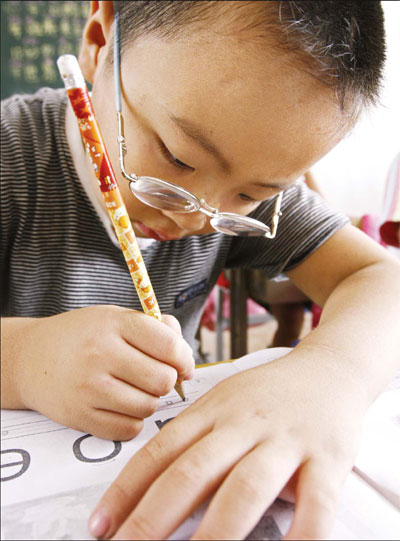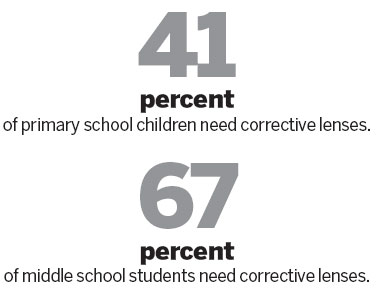The long and short of it
Updated: 2012-01-04 11:09
(China Daily)
|
|||||||||||
 |
|
Shortsightedness is on the rise among Chinese schoolchildren. Xu Xiaolin / For China Daily |

Reading, screen time and a lack of exercise are blamed for an increase in nearsightedness in Chinese children. Liu Zhihua reports.
Pressure to succeed academically means Chinese children, even preschoolers, are taking extra lessons and giving up exercise. Screen time in front of computers and TVs is another factor for the rise in the incidence of myopia among students.
A Ministry of Education report in September, based on a national survey in 2010 of about 350,000 youngsters ages 7 to 22 in 31 provinces, highlights this fact.
Among primary school children, almost 41 percent need corrective lenses, mostly for myopia (shortsightedness). The figure rises for middle school and university students, respectively, to 67 percent and 85 percent.
"Kids, especially those younger than 6, undergo the most important physical and functional development of the eyes," Zhou Zhe, an ophthalmologist at Beijing Tongren Hospital, says.
"Prolonged close-up visual activities and a lack of outdoor activities will easily lead to myopia and make the situation worse."
Zhang Tongxin, 16, is a student at a junior middle school in Changzhi city, Shanxi province. Zhang says she can't see what's on the blackboard if she takes off her glasses - which are 400-(left eye)/450-degree glasses.
Zhang was found to be shortsighted at her physical checkup when she was about 9.
"Before the checkup, there were only three to four students wearing glasses in our class, and I thought they were cool. Now I don't want to wear glasses, but I have to," says Zhang, who is the first to wear glasses in her family.
"As children get older, the incidence rate of myopia, as well as the degree of shortsightedness, climbs very quickly," says Zhang Yalin, an eye specialist with Huaxin Hospital, also known as the First Hospital of Tsinghua University in Beijing. "We call the phenomenon 'school related myopia'."
Genetic factors do contribute to the eye problem, and some Western researchers suspect that East Asians are more genetically predisposed to myopia. But Zhang Yalin believes the major causes of myopia among Chinese children are too much reading and screen time, a lack of outdoor activities and a bad diet, rather than genetic factors.
"We don't have time to care for our eyes, and no one does eye exercises," middle schooler Zhang Tongxin says.
At school, kids attend classes, and at home, they do loads of homework. Even on weekends and holidays, studying is a major concern.
Zhang Tongxin adds that one of her weekly physical education classes has been substituted for an English-language class.
This is common practice at many schools, as the unwritten rule goes that exercise is good, but study comes first.
Huang Chun, a Chinese-language teacher at Beijing No 4 High School, one of the country's best, says more than 90 percent of his students are shortsighted.
But when he was at high school in the 1990s, only about 10 percent of students in his class wore glasses.
"I'd never heard about myopia until I came to the city to study at high school," Huang says.
The bigger the city is, the more pressure to study children will experience. Consequently myopia will increase, Zhang Yalin, of Huaxin Hospital, says.
Outdoor activities offer the eyes the opportunity to look into the distance and relax. Without this, the ciliary muscle, a ring of muscle in the eye's middle layer, is affected.
"The ciliary muscle contracts to focus on near objects, and relaxes the other way around," says Zhou Zhe, the eye specialist at Beijing Tongren Hospital.
"But it is always easier for the ciliary muscle to contract than to relax."
If the ciliary muscle doesn't relax for a long time because of close-up visual activities, its ability to focus on distant objects will be harmed, causing pseudomyopia (an intermittent and temporary shift in refraction of the eye toward myopia). If this continues, it will develop into myopia.
"Our eyes are not structurally stabilized until about the age of 20," Zhou says.
Since children have smaller eyeballs and do not have the same ability as adults to focus their eye muscles, they must work harder to see nearby objects, and their eye muscles are less likely to relax, increasing the likelihood of myopia.
"Electronic screens are bad for children's eyes," Zhou says.
Screens often have low contrast among words, images and backgrounds, and thus can easily make the eyes tired.
Children are unlikely to rest their eyes either automatically or intentionally when they pay attention to the screen or play games. This will affect their sight.
"It is wrong to let children spend too much time on computers and watching television," Zhou says.
Once they become shortsighted, it is hard to get rid of the problem, Zhou explains.
The most common intervention against myopia is wearing glasses or contact lenses, which are used to stop the worsening of the situation rather than reverse it.
Even corneal refractive surgery is like making a pair of glasses out of the cornea forever, and it is only applicable for adults who fit the preconditions, Zhou notes.
Zhou also says many of the so-called once-and-for-all solutions to myopia on the market are not reliable.
"Good habits and exercising are more reliable to stop the development and worsening of myopia," Zhou says.
When He Shiyu, a 10-year-old boy, entered Beijing Fangcaodi Primary School four years ago, he was the only one wearing glasses in class. Now, many of his classmates have become shortsighted and have higher degrees of shortsightedness than he does.
"We are very careful since he was found to be shortsighted during a kindergarten physical checkup," his father He Xiaohang says.
As a result, He Shiyu is asked to rest his eyes and look out from the apartment balcony. His mother also ensures he gets out for a 30-minute walk every day.
His time spent on TV and computers is also strictly controlled.
Today's Top News
Rescuers race against time for quake victims
Telecom workers restore links
Coal mine blast kills 18 in Jilin
Intl scholarship puts China on the map
More bird flu patients discharged
Gold loses sheen, but still a safe bet
US 'turns blind eye to human rights'
Telecom workers restore links
Hot Topics
Lunar probe , China growth forecasts, Emission rules get tougher, China seen through 'colored lens', International board,
Editor's Picks

|

|

|

|

|

|





